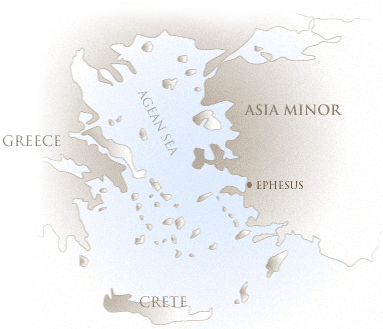Ephesus and its neighbours
Ephesus, as one of the great harbours of Asia Minor, was always a center for commerce; and its Temple of Artemis even performed some functions of a bank, holding money in its treasury for safekeeping. It is no wonder that businessmen from all over the Mediterranean, including Rome, settled there, and that the Roman governor of the province of Asia made it his headquarters. This did not mean that Ephesus was dominant over the many other cities of Asia, however; it made alliances and friendships with some cities, and had long-standing rivalries with others.

Coinages that proclaim the "concord" (Greek homonoia) between two cities ( 26 , 28 , 36 ) can be used to illustrate how Ephesus formed its relationships with other cities in its province and beyond. So far as is known Ephesus issued, or had issued for it, "concord" coins with at least 23 cities. Unfortunately, we don't have many documents to tell us what sort of relationship (political? economic?) is being celebrated.
One type of bond we can discern is that of religion, when the cities' patron gods were related to, or similar to, each other. For example, Ephesus' alliance with Hierapolis ( 30 ) may have been based on the fact that Hierapolis' patron god was the brother of Artemis, Apollo; so the two cities could also be considered brother and sister.
There were also friendships that extended beyond the borders of the province. Ephesus issued an important series of coins in the name of another great harbor, Alexandria, in the time of the Emperor Gordian III. The coins show the goddess Fortune with the seafaring rudder, gods peculiar to Alexandria, or the patron gods of both cities interacting with each other ( 37 ). Images of or like Artemis pictured on other cities' coins may indicate that those cities had brought in a cult of Artemis from Ephesus.
On the other hand, Ephesus had its rivals within the province: great cities like Pergamon and Smyrna, both of which became neokoros before Ephesus did (q.v.). Each of the three cities claimed to be metropolis of Asia, and all kept a jealous eye on the others' honors and titles. Inscriptions found at Ephesus refer to an incident where Ephesus wrote to Antoninus Pius to complain that Smyrna and Pergamon were not giving Ephesus its proper honorific titles. Antoninus replied by trying to soothe ruffled feelings, but required that Ephesus receive the titles he had approved for it, and asked the cities to give each other their proper titles. Ephesus obviously saw this as a victory, as it engraved the Emperor's letter on stone at least twice, and issued coin ( 28 ). Though it ostensibly celebrates the restoration of "concord" between the three cities (symbolized by their patron gods), Ephesus has put its own Artemis in the place of honor, in the center. And it is worth noting that neither Smyrna nor Pergamon issued any coinage to show their concord with Ephesus at this time.
